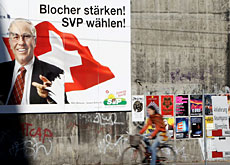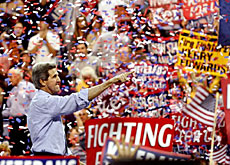Funding free-for-all favours rightwing

The absence of rules on party funding is giving the rightwing Swiss People's Party a clear advantage ahead of October's elections, says a political scientist.
In an interview with swissinfo, Geneva University professor Pascal Sciarini says anonymous donors are bankrolling an increasingly American-style campaign marked by unprecedented media coverage.
Sciarini says party policies have taken a back seat during the run-up to next month’s parliamentary elections as personalities and negative campaigning have dominated the electoral landscape.
First came the People’s Party notorious poster campaign showing three white sheep kicking a black sheep over the Swiss border. Then the party’s figurehead, Justice Minister Christoph Blocher, grabbed the headlines, complaining of a plot to unseat him.
swissinfo: The election campaign has so far been dominated by the Swiss People’s Party and there’s been little said about actual policies. Why is this?
Pascal Sciarini: I think the answer is Blocher. There are very important issues in Switzerland but the electoral campaign has turned into a very personalised campaign based on the image of Christoph Blocher. Therefore there is not much room for discussion about important issues, and this is something very unusual in Switzerland.
swissinfo: The centre-right Christian Democrats have made Economics Minister Doris Leuthard a focus of their campaign – and they are up in the polls. Have other parties been taking a leaf out of the Blocher book?
P.S.: We talk about the Americanisation of electoral campaigns all over Europe and Switzerland has not escaped this trend. Other parties, including the Christian Democrats, are trying to base their campaign on people. Doris Leuthard is a woman, she is responsible for the economics ministry, she is doing a good job and the party of course tries to build on this and attract new voters through her.
We can see also this trend with the Greens and the [centre-left] Social Democrats, which goes hand in hand with a move towards mediatisation. There has been a huge effort by Swiss television and radio stations and it’s the first time that the media coverage has been so big.
swissinfo: The People’s Party was clearly the most media-savvy during the 2003 elections and they seem to have pulled it off again. Why have the other parties been slow to catch up?
P.S.: I think there are two reasons for this. The first is to do with tradition: there is no tradition of electoral campaigning in the American sense of the term in Switzerland. The second reason is that the political parties are very weak in Switzerland. They have no money, they have no organisational resources, and if you want to carry out a very active electoral campaign you need a lot of money.
What is very striking is the presence of the People’s Party. We see their posters everywhere, in the streets, in newspapers, but I don’t see the other parties.

More
Swiss People’s Party
swissinfo: Why does the People’s Party appear to have such a huge financial advantage over its rivals. Is there no cap on campaign funding, as there is in other countries?
P.S.: There are no budget limits, there is no transparency and there is no public financial support for the parties. Therefore the system is very opaque and we don’t know exactly where the money comes from. Some people say the People’s Party has spent at least SFr20 million ($17 million) on the campaign, which is quite unusual. The official budget for the electoral campaigns of the Social Democrats or the [centre-right] Radical Party is SFr1.2 million.
The Social Democrats are trying at the moment to propose a new federal law, which would limit the expenses that a party is allowed during an election campaign. It may come in the future but there is no limit at the moment.
swissinfo-interview: Adam Beaumont
Switzerland has no transparency laws on political party financing. On Wednesday the House of Representatives rejected a motion from a centre-left Social Democrat calling for parties and candidates to publish the names of donors and the amounts received.
Roger Nordmann, the parliamentarian behind the initiative, said more transparency was needed to see who was actually funding election campaigns.
Opponents from centre-right and rightwing parties said they recognised the merits of the idea but said it would be impossible to put a failsafe system into practice. They also claimed that lifting anonymity would scare off potential donors.
Results based on interviews carried out mid-September among 2,022 people from across the country.
Swiss People’s Party: 26.7% (no change on 2003)
Social Democrats: 22.3% (-1.0%)
Christian Democrats: 15.4% (+1.0%)
Radical Party: 15.0% (-2.3%)
Green Party: 10.6% (+3.2%)
Conclusions from the latest poll by the gfs.berne research institute:
· Swiss People’s Party as strong as in 2003 elections; Blocher campaign successful.
· Green Party the biggest winner in percentage terms.
· Christian Democrats have the most popular cabinet minister, Doris Leuthard, and are still ahead of the Radicals.
· Radicals have recovered slightly but have the least popular cabinet minister, Pascal Couchepin.
Expected turnout: 53% (+7.6%)

In compliance with the JTI standards
More: SWI swissinfo.ch certified by the Journalism Trust Initiative


You can find an overview of ongoing debates with our journalists here. Please join us!
If you want to start a conversation about a topic raised in this article or want to report factual errors, email us at english@swissinfo.ch.